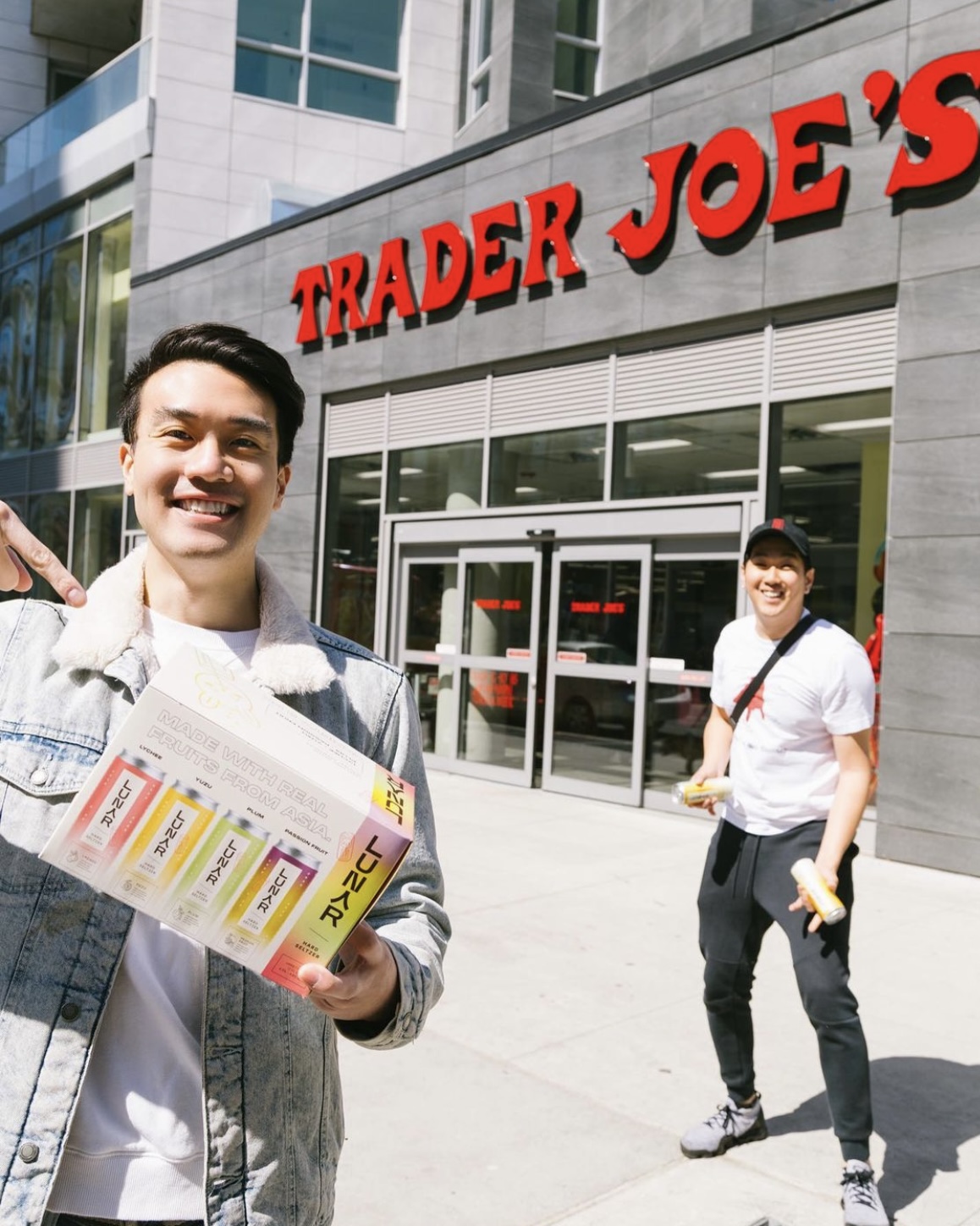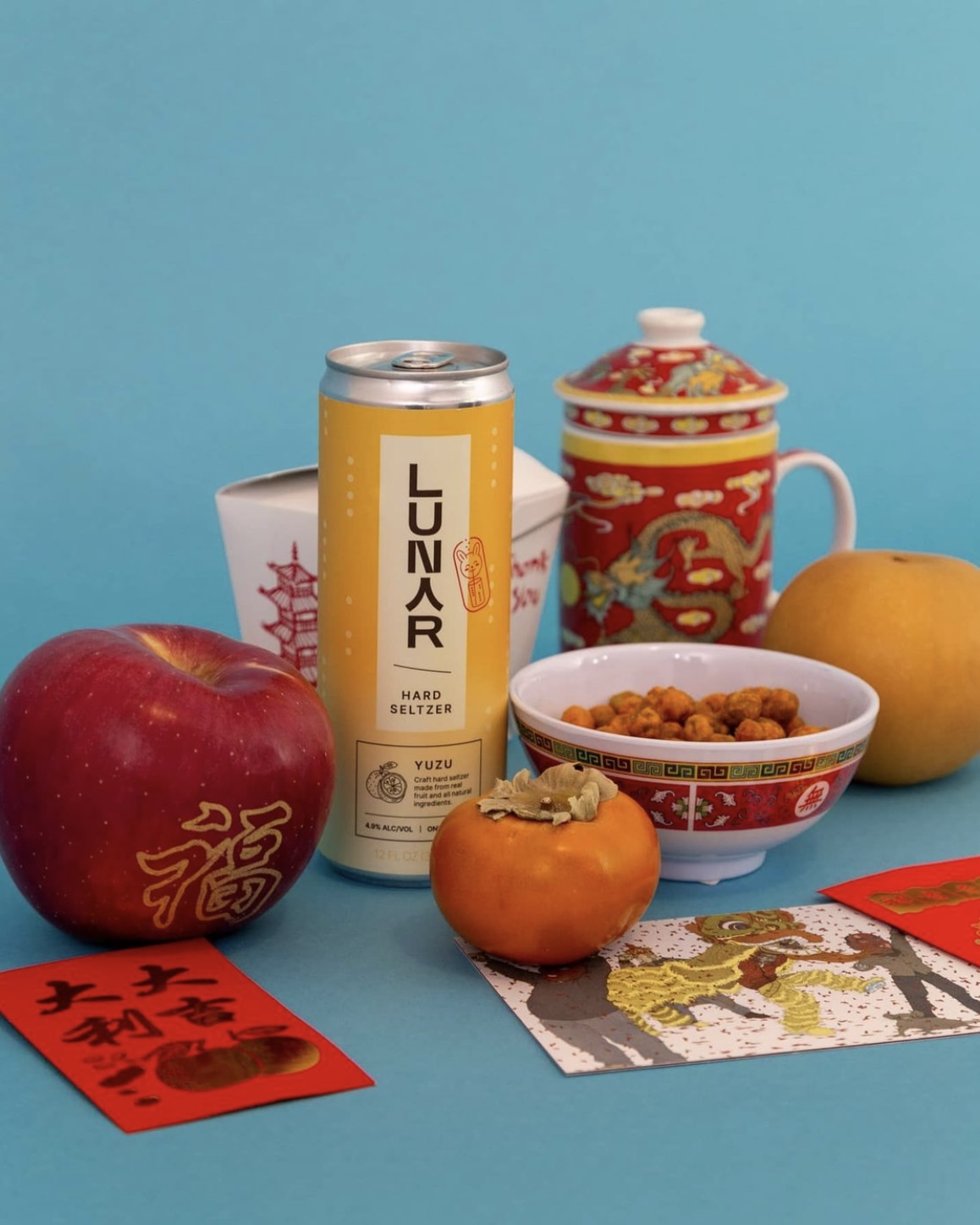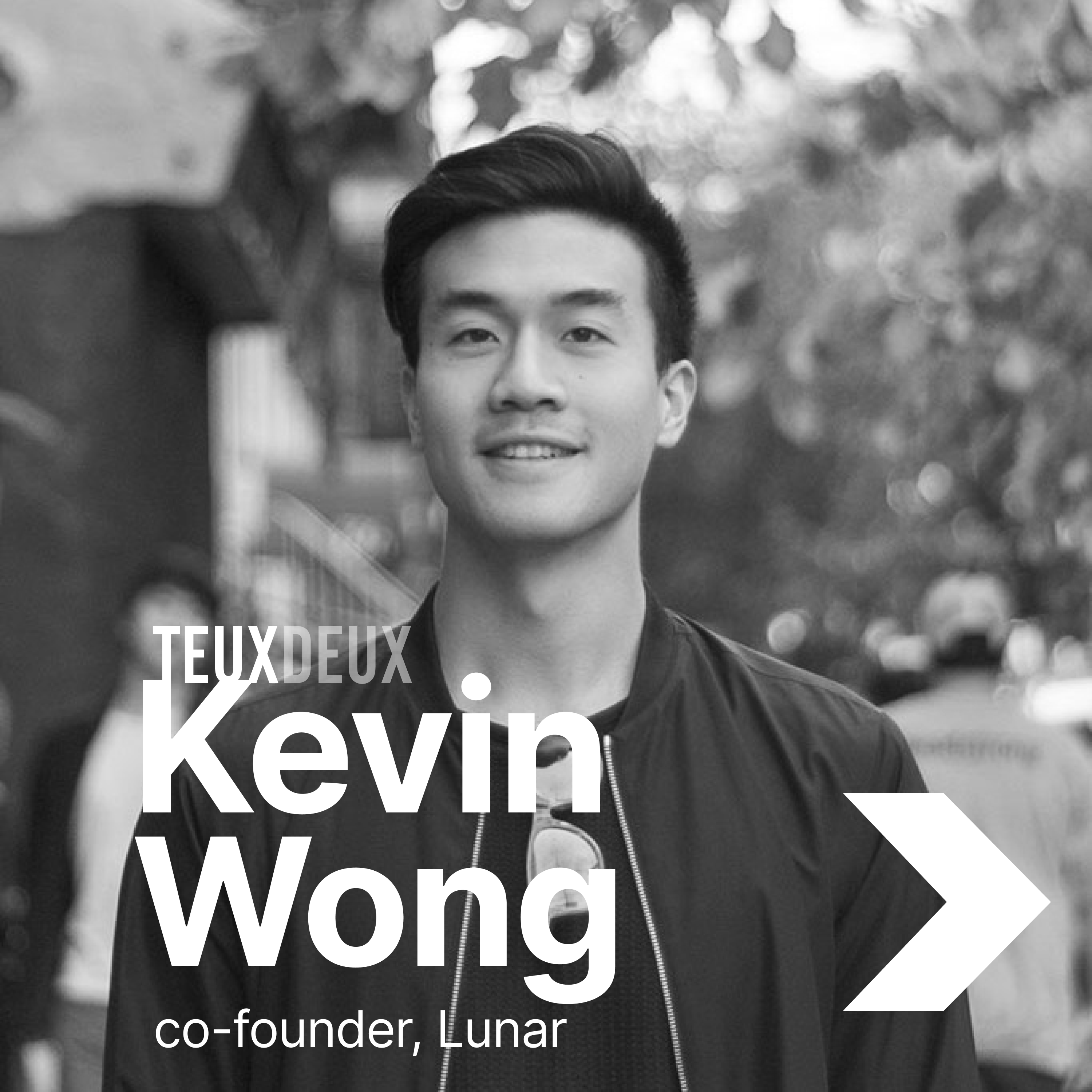Interview with Kevin Wong:
This month, we sit down with Kevin Wong, co-founder of Lunar, the first Asian-American craft hard seltzer company. We talk about launching a startup in a crowded category in the middle of a pandemic, building a brand that’s an extension of yourself and your community, and testing the waters of entrepreneurship while you’re at your day job. Kevin shares what he's learned working in finance, startups, and his previous business venture, and how he's applying all those lessons to Lunar.
Read some of the interview highlights below:
When did you really first get the entrepreneurial bug?
Towards the end of my tenure in finance, I actually started a company called Apartment Insider. This was apartment visiting as a service. So imagine you're moving to a new city, right? You don't know anyone in New York, let's say, and you need to find an appointment because you're starting a new job. Well, the first alternative is that you fly to New York and you scramble about, finding a hotel, getting a broker and trying to find a place in the highest stress, high pressure environment.
Or you could use Apartment Insider, which is equivalent to having a friend in the city visit apartments for you. Take video recordings, ask the questions you want to ask and send it back to you. That was my first foray and I built that during my off hours banking, and ultimately found out that I didn't go all in on myself.
I didn't really believe in myself and the idea to go after it fully. And that's kinda why it didn't succeed. So that was a big part of the lesson learned that led me to avoid that this time around with Lunar.
You and your co-founder, Sean, both had full-time jobs while running Lunar in the early days. Do you think the long hours in investment banking helped prepare you for that?
I think part of it , maybe, but I think it's less the banking grind but more so the work ethic that both of us had growing up. Both of us come from not very well to-do families and so work ethic has always been instilled in both of us. Actually, we have similar backgrounds. We both, grew up in Maryland, and then both went to college together. So we had the same shared background there. Working hard at something you believe in, and it's also easier to work hard on something that you're passionate about, that you care more deeply about it. It comes more naturally.
How were you organizing your time and keeping from getting overwhelmed when, juggling a day job and trying to run your own business in the off hours?
I am a big to-do list person. I have multiple actually, and they're categorized by like personal one versus work versus other things. And so I'm a stickler for that and I also live and die by my calendar. From blocking off time to, for example, time to R and D and time to brew, or blocking off time to reflect or blocking out time for personal life.
As an entrepreneur, you are most infinite resource, so to speak, is time, right? More often than not, you don't have the luxury of money to spend to solve problems and make them go away. And so you need to solve problems by investing your time and managing that down to the minute is pretty crucial. Although pretty excruciating in the beginning.

What's your unfiltered advice for people who have a day job and might be thinking about starting a business or a side gig?
Don't quit your day job too soon, you know? I think the hardest part of entrepreneurship is making that leap. And it's hard to know if you're ready for that leap. It's a really big one. And there are a lot of ways to test the waters, to see if you're ready for that leap.
Entrepreneurship may not be for everybody. It's like having a kid, and then some. It's draining physically, mentally, emotionally, and you never know what you're getting yourself into fully. One of my mentors told me, "You don't ever know how to start a company until you start a company."
You can't just read articles online, listen to interviews and be like, "oh yeah, I understand how it is to start a company." You don't really know because with all the highs, you know, that you see in media and the press, and then on LinkedIn, there's a ton of lows that you don't see the grind of packing boxes and lugging them via my apartment Dolly, and bringing that to the UPS at 8:00 AM in the morning, every single day, or even on Saturday. You don't see those moments necessarily every day. And it's because no one necessarily wants to see them, and so there is that kind of interesting thing where there's this shadow-verse of how it is to be an entrepreneur or that people talk about, oh yeah, being entrepreneur is so hard." But what about it is so hard?
You don't get to see that minutia until you live it. So I would definitely recommend, stay at your day job unless you have that financial cushion or unless you're otherwise ready to make that leap. And when you make that leap, just know that it's always better with it with a friend with a co-founder.
How long did it take for you to get to that point of knowing you were ready for entrepreneurship?
Well, I guess the, the time period from my first startup until this one was about seven or eight years. And so I think it took me eight years to really feel comfortable. A lot of the learnings I experienced, at Yext, which was my previous job, there were a lot of ways in which I was able to dip my toes into entrepreneurship, internally. So being an intrapreneur, from starting new initiatives to building teams, to launching a new market, These are like micro moments of entrepreneurship that have some of it, but not all of it. That let me test the waters so I knew a little bit better of what it could look like and with Lunar.
So we spent about a year and a half learning how to brew in our apartments in New York. Our idea came about in early early 2019 when my co-founder and I were eating Korean fried chicken and we realized that, Hey, why are we drinking Bud Light when the venue is so authentic and thoughtful? And so, a year and a half of brewing later in, a year and a half of researching alcohol laws and this and that, when we finally launched in October of 2020, we were lucky that we sold out. And we were like, well, this seems like we might be onto something. It seems like we've made something that resonates with a lot of people. And it seems like we should probably try to go at it a little bit more though. In some ways we were blessed that our hand was forced because starting any CPG business is very capital intensive.
We had put enough of our own money to kind of start, but we weren't able to go all in unless we raised money from friends and family and other people. And so we were kind of forced to do that to even begin the company. After doing so well, the next question is well, we have other people's money...they probably expect us to work on this full-time. And so we were kind of forced into that situation and you know, having worked for so many years, we had some savings that we could rely on to at least go full-time and give it a shot, so we were in that position where we were kind of, our hand was forced, so to speak.
How did you guys land on the idea of doing a seltzer in the first place? And did you ever have any misgivings either at the beginning or, as you've been growing the business about entering this fast paced, fast-growing category?
So when we had the idea at that fated Korean fried chicken dinner. The observation was simply that the drink menu lacked options that spoke to and resonated with myself, my co-founder and our community. It wasn't that, hey, hard seltzer, we should do it ourselves.
It was that we simply saw that lack of representation on the drink menu. So when we started learning how to brew, we were actually trying to make beer. And we made some really gross tasting beer. So that was quickly ruled out as like, well, we're not very good at this, but in 2019, when we were doing all this R and D, that was when White Claw had its infamous shortage during the summer.
And we saw that as an opportunity, both from a market growth perspective and trend perspective, but also having had many White Claws myself. We were like, look, this doesn't really taste like much and it could be a really good canvas for us to paint upon. The thing that we latched onto was perhaps the hard seltzer format is a good one for us to kind of express what we want to express. So we pivoted our brewing learnings and experiments to making seltzer and yeah, one thing led to another and we ended up making a really delicious one that people loved.

Lunar has this really unique proposition of premium ingredients and flavors sourced from Asia, and that has been important and central to the brand since the beginning. One, why was that so important? And two, in theory, is there a version of this business that's easier to make and less of a hassle to you logistically?
Our goal is to really accurately portray and share these flavors and stories, from our childhood, from our heritage. I spent my summers growing up, in Taiwan, and one of my favorite childhood memories is grandma taking me to food stalls and buying lychee. That sensation of biting into lychee in that sweltering tropical heat, that is like a core memory for me. That's an experience that I think a lot of other people share. For us, with Lunar as a very authentic, very unapologetic brand. It's important to us to replicate that as much as we can.
For those who are familiar with our flavors, for them to try our product so it'd be like, wow, that reminds me of this time when I was a kid that reminds me of my summer in Korea, that reminds me of something. And we didn't feel like we could do that if we took liberties on creating the product. For people who are new to the flavors that we're bringing to the table, we wanted their first experience with yuzu to be very real. This is something we've talked a lot about because at Lunar now we use real fruit juices sourced from Asia. We use really high quality stuff and we don't use any chemicals. There's no artificial flavors, and that makes sourcing a challenge.
It's definitely difficult to be bringing in all these different ingredients over to our facility. And, you know, using real fruit juices adds a lot of costs. But when we see people try a drink, people will notice a difference. Almost all other hard seltzers use artificial flavors. Hard seltzer with natural flavors, which are just chemicals. When you try those products, you can tell the difference. Our brand can't support that. Our brand is about high quality and our brand is not about that false veneer of flavor.
And so, you know, even for us, right, when we think about producing and expanding the company, that's one of the pillars of the company that we can't give up on. Staying true to ourselves and being high quality.
How do you juggle or how do you think about that sort of awesome responsibility and this representation being central to your brand while also very personal to you?
I think the past three years have been so monumental for our community, for the Asian American community, from Crazy Rich Asians to Bling Empire, to Squid game. There's so many facets of the Asian-American experience that are now making their way into the mainstream. And it's been accelerated by the pandemic. For better or worse, things happen for a reason. And now here we are with a very vibrant and thriving movement here.
People say this all the time, right? Asian-America, any group, is not a monolith. And there are people who are against the term "Asian-American" because they feel that that kind of hand waves over all of the different nuances and different cultures that comprise Asian America. But I think the term is a valuable one because it combines all of us under that singular roof and there are a lot of similarities across cultures that we share that we should be proud of and that we should be highlighting. Now I think the most important thing as I think about this brand and Lunar, Lunar is very personal to myself and my co-founder , it is our facet of Asian-America. It is a piece of our lived experience that we are sharing with everyone. And that may not be the same for everyone else. We can't purport to say that we represent everyone, but we can represent different facets that we know how to represent. And I think that's the best way. Is that we can be authentic about sharing our experiences as best we can without purporting to speak for others.
When you think about the future of Lunar, are you kind of horse blinders on, just thinking about incremental milestones or do you have grander ambitions for five or 10 years down the road? Or is it a mixture of both?
I will say that, when you're in the trenches, it's definitely hard to peak back out. For us, a lot of the things we do are very focused on he very short-term. We're always thinking about week to week, month to month, quarter to quarter, just because as a startup company, every month is a very significant percentage of the time you've ever been in business.
And so that's kind of the focus generally, so for us this year, the focus is continue getting into more stores, continue building more awareness of Lunar. It's the same simple mandates, but just doing that better and faster. But when we take time to reflect, it's revisiting our north star, reaffirming that that is indeed where we want to go. And for us, I think there's a few variations of that north star.
Our big, hairy, audacious goal, the one that's like 40 years out, is to be a company that when my kids graduated from college, that they want to work for. That we're spoken in the same breath as Apple or Goldman Sachs or Microsoft of today, that they, instead in 20 years, they say, I want to work at Lunar and to have a prominently Asian-American company as someone's top choice of the next generation, that is a huge win.
So that is like the future future state, Maybe a little bit less far away, maybe 20 years out, I think for us is to become a company similar to Disney, where we have a whole experience that shares facets of Asian America beyond beverage, but across a lot of different other aspects of life. And that can all live in an experience somewhere. And maybe in 10 years, although a more medium-term goal is to have Lunar in stores across the U.S. and the biggest win would be if we're in a small restaurant in the middle of Kansas.
That would be sincerely amazing because that would mean that we've made it. That we've really demonstrated what it means to be Asian America, that we've shown that being Asian is being American. And that, I think, is a much more achievable midterm goal that I think we can definitely achieve in 10 years.
Kevin, thank you so much for being here today. Can you tell us where we can find Lunar?
Yes. If you live in New York, Virginia, or Georgia, you can find lunar in stores and restaurants. Most recently at trader Joe's. If you don't live any of those states, fear not, you can buy Lunar online at drinklunar.com and we ship to most states. And feel free to follow us @drinklunar on Instagram, where you'll find out all the latest news about things like limited edition flavors, merch and beyond.
